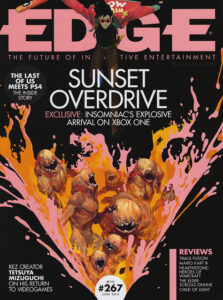The Future of Print is Obvious: It’s a Marketing Gimmick
A few weeks ago I moderated a panel on the future of print at 2020 Publishing in London. A panel of industry veterans discussed their optimism for the medium, noting that it is still a lucrative endeavour for national newspapers that still print huge numbers of copies, and for B2B and trade magazines.

One thing that I took away from the lively panel was that print absolutely still has a place at the legacy publishers – namely as a source of non-incidental revenue as they transition to newer, more diverse sources of revenue. That’s no surprise; a quick glance at the latest ABC figures suggests that media companies are riding that long tail of print decline in an effort to become primarily digital companies, some more successfully than others.
But managed decline is demonstrably not a ‘future’ with a long shelf life. Instead, the panel acknowledged that new print products, launched in 2019 and beyond, will not be the solid single source of revenue that newspapers and magazines have been historically. Instead, the future of print appears to have more in common with another ‘dead’ format: vinyl.
Like vinyl, most new print products launched over the past few years have been smaller, niche titles. Some, like the re-launch of Paste, piggyback on people’s affection for a brand while others, like Foul Play or Film Stories, launch fresh as a highly specialised product. Film Stories’ founder and editor Simon Brew said that niche-based rather than demographic-based publishing is viable:
“Coronation Street viewing is a niche, isn’t it? It’s just a huge niche. I mean it’s just another term used to subdivide people’s interests in my mind.
“We’re talking about the below the mainstream, the very segmented interests. I also think you’ve got ways to get to small audiences with magazines, websites and books now that just didn’t exist 10/15 years ago, that an assortment of barriers with very big difficulties associated, have come down, or become easier to negotiate.”
Those titles have much in common with the specialised vinyls that were launched over the past few years. One, spun off the podcast Tell ‘Em Steve Dave, was a crowdfunded effort to launch the world’s first vinyl podcast (semantics about RSS be damned), while other vinyl releases are limited runs of albums and singles. They’re small, niche, and lightly profitable or just breaking-even. Their obsolete nature is part of the selling point: in a world of immediate information and ephemeral digital formats the permanence and, frankly, the inconvenience of the formats help them stand apart.
The other primary purpose of print that we are likely to see is as a marketing gimmick. Last week BuzzFeed published a print newspaper and distributed it around New York City. Everything about the endeavour reeks of a gimmick – perhaps to distract from the recent pessimism about the future of digital pureplays – from the printed gif to the headline that focuses on a storm in a teacup moral panic. It was a one-off product, one that BuzzFeed apparently has no plans to repeat.
In the UK, the NME was recently revived for a one-off issue through a partnership with Netflix to promote the first season of The Umbrella Academy. While it was probably an experiment to see whether other such partnerships can work, the financial realities that led the NME to fold its print operations last year make it practically impossible that it will be revived as a permanent institution. Instead, it’s marketing gimmick – one that benefits TI Media, absolutely, but a gimmick nonetheless.
Meanwhile, some high profile print collapses over the past few years have demonstrated that new print titles have a very hard time finding a mainstream audience. The New Day had a muddled launch and precious little marketing, but it’s unlikely that it would have succeeded anyway, while campaign-focused titles like The New European and The National are flags to wave in support of the mission. The fact that they’re in print is a gimmick in itself.
None of that is to disparage the work that goes into print products, either the new niche titles, the out-and-out gimmicks, and especially not the journalists toiling on the legacy titles as they decline. It’s easy to be optimistic about the quality of future print titles, but optimism about the future of the media is more nuanced.
Chris Sutcliffe
enquiries@trippassociates.co.uk
Martin Tripp Associates is a London-based executive search consultancy. While we are best-known for our work across the media, information, technology, communications and entertainment sectors, we have also worked with some of the world’s biggest brands on challenging senior positions. Feel free to contact us to discuss any of the issues raised in this blog.